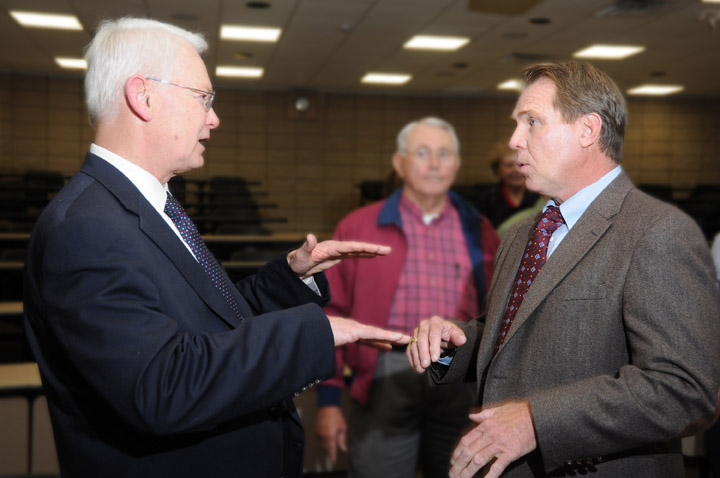
FAYETTEVILLE, Ark. — Plant pathologists at the University of Arkansas Division of Agriculture have made important contributions to the sustainability of Arkansas agriculture, particularly in the success of important crops like rice and soybeans, said Steven A. Slack, associate vice president for agriculture administration and director of the Ohio Agricultural Research and Development Center at Ohio State University.
Slack is the last of several alumni and former faculty members to speak in the Plant Pathology Centennial Seminar Series, which began Sept. 4 and concluded Nov. 20. The U of A department is one of the oldest stand-alone plant pathology departments in a university in the United States.
Slack cited the example of UA plant pathologists combating the soybean cyst nematode, a microscopic worm that threatens soybean fields throughout the state.
“Arkansas plant pathologists have given growers the essential tools they need to control this serious pest and keep the soybean industry viable in the state,” Slack said.
Rick Bennett, UA plant pathology department head, added the example of rice blast that traditionally has been a huge problem in the state.
“Our plant pathologists work with breeders to develop varieties that are resistant to blast,” Bennett said. “We’ve been recognized for saving growers’ a lot of money that otherwise would be necessary to control this disease.”
Arkansas’ rich growing environment also happens to support numerous disease pests, Bennett said. “Our research programs have helped keep numerous disease problems under control.”
Bennett said Arkansas plant pathologists are very active in the Asian soybean rust monitoring and surveillance program, for example. “We make recommendations on when to spray or not to spray and contribute to the national rust prevention programs,” he said.
“The program has been very successful,” Bennett said. “It recommends to growers when to spray fungicides only when needed as a control measure instead of having to spray much more frequently as a protection. It saves them money and anxiety.”
Slack said, “Arkansas has a very active plant pathology department that is leading in new technologies that keep agriculture viable in the state, saving money for farmers and protecting the environment with new strategies that reduce the use the pesticides.”
Slack, the son of former plant pathology department head Derald Slack, received B.S. and M.S. degrees from the University of Arkansas and his Ph.D. from the University of California-Davis. He received the Outstanding Alumnus Award from Dale Bumpers College of Agricultural, Food and Life Sciences at the University of Arkansas in 1996.
In 1975, Slack joined the plant pathology department at the University of Wisconsin-Madison and in 1988 he moved to Cornell University as the Henry and Mildred Uihlein Professor of Plant Pathology; he served as department chair from 1995 to 1999. He has been in his current position at Ohio State since 1999.
Slack said his father had a tremendous impact on the career choices he’s made.
“Dad never pressured me to enter plant pathology,” Slack said, “but he served as a sounding board and guide as I decided which way I wanted to go.”
“The faculty at the U of A also have a big impact on the decisions their students make,” Slack continued. “They certainly had an impact on my career decisions. They taught me professionalism and how important it is for a scientist to understand the problem at hand and to design experiments to address the issue.”
Looking ahead at the future of university academic and research programs, Slack said he expects state support will remain tight for state universities while, at the same time, accountability will continue to rise.
“States will desire economic returns for their higher education investments,” Slack said. “At the same time, I expect to see an increase in public-private partnerships.”
Pathologists, Slack said, will need to increase flexibility in what they consider to be their research territory. “Science funding is trending toward big issues that require multi-investigator and multi-discipline approaches,” he said.
Although plant-pathogen interactions will remain the core of plant pathology, Slack said he also expects to see a convergence of agricultural and medical sciences that will present new opportunities for growth.
Slack said new career opportunities are opening for plant pathology graduates.
“It used to be that students who earned a Ph.D. were bound for careers in academia,” Slack said. “Now, new job opportunities are opening in industrial sectors, particularly in bioenergy fields where there are big opportunities for our skill sets.”
Slack is a fellow and past president of the American Phytopathological Society, an honorary life member and past president of the Potato Association of America, and a fellow of the American Association for the Advancement of Science (AAAS). Other honors include a USDA Group Honor Award for Excellence in 1995 for work on a non-pesticidal control strategy for the potato golden nematode and the meritorious service award for research by the National Potato Council in 1997. He is NABC's chair for 2005-2006.
Topics
Contacts
Fred Miller, agricultural communications
University of Arkansas Division of Agriculture
479-575-5647,
Rick Bennett, head of plant pathology department
Dale Bumpers College of Agricultural, Food and Lif
479-575-2598,